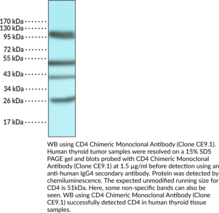Territorial Availability: Available through Bertin Technologies only in France
- Correlated keywords
- CD-4 Th-1 2 17 auto-immunity
- Product Overview:
CD4 is a type I transmembrane glycoprotein that functions as a T cell receptor (TCR) co-receptor.{59673} It exists as a single polypeptide chain composed of four extracellular immunoglobulin-like (Ig-like) domains that interact with MHC class II molecules, a transmembrane domain, and a cytoplasmic tail that associates with the tyrosine kinase LCK and mediates signal transduction to the TCR, which is essential for T cell activation.{59674} It is expressed on the surface of, and used as a marker for, T cells, and its expression is used to characterize the development stage of thymocytes. Upon binding to antigen-displaying MHC class II molecules expressed by antigen-presenting cells (APCs), naïve CD4+ T cells differentiate and proliferate in a cytokine-dependent manner into a variety of T helper (Th) cell subsets, including Th1, Th2, and Th17 cells, which enhance and direct innate and adaptive immune cell responses to numerous pathogens and have additional roles in cancer, asthma and allergy, and autoimmunity.{59675,59676} CD4 is also the receptor for HIV attachment and entry into cells, resulting in depletion of CD4+ cells in patients infected with HIV.{59677,59678} Cayman’s CD4 Chimeric Monoclonal Antibody (Clone CE9.1) was produced recombinantly from the original CE9.1 antibody sequence and can be used for ELISA, flow cytometry (FC), and immunohistochemistry (IHC) applications. The CE9.1 antibody was generated by fusing IgG4? constant domains to the antigen-binding domain of a primate anti-CD4 monoclonal antibody.{64740}
Cayman Chemical’s mission is to help make research possible by supplying scientists worldwide with the basic research tools necessary for advancing human and animal health. Our utmost commitment to healthcare researchers is to offer the highest quality products with an affordable pricing policy.
Our scientists are experts in the synthesis, purification, and characterization of biochemicals ranging from small drug-like heterocycles to complex biolipids, fatty acids, and many others. We are also highly skilled in all aspects of assay and antibody development, protein expression, crystallization, and structure determination.
Over the past thirty years, Cayman developed a deep knowledge base in lipid biochemistry, including research involving the arachidonic acid cascade, inositol phosphates, and cannabinoids. This knowledge enabled the production of reagents of exceptional quality for cancer, oxidative injury, epigenetics, neuroscience, inflammation, metabolism, and many additional lines of research.
Our organic and analytical chemists specialize in the rapid development of manufacturing processes and analytical methods to carry out clinical and commercial GMP-API production. Pre-clinical drug discovery efforts are currently underway in the areas of bone restoration and repair, muscular dystrophy, oncology, and inflammation. A separate group of Ph.D.-level scientists are dedicated to offering Hit-to-Lead Discovery and Profiling Services for epigenetic targets. Our knowledgeable chemists can be contracted to perform complete sample analysis for analytes measured by the majority of our assays. We also offer a wide range of analytical services using LC-MS/MS, HPLC, GC, and many other techniques.
Accreditations
ISO/IEC 17025:2005
ISO Guide 34:2009
Cayman is a leader in the field of emerging drugs of abuse, providing high-purity Schedule I-V Controlled Substances to federally-licensed laboratories and qualified academic research institutions for forensic analyses. We are certified by ACLASS Accreditation Services with dual accreditation to ISO/IEC 17025:2005 and ISO Guide 34:2009.





